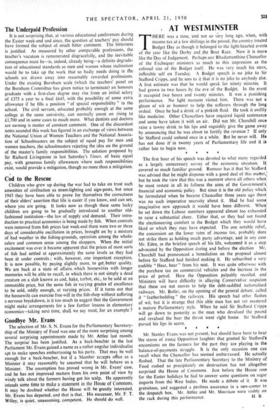Cod to the Rescue
Children who grew up during the war had to take on trust such amenities of civilisation as street-lighting and sign-posts, but since 1945 they have been able to prove for themselves the correctness of their elders' assertion that life is easier if you know, and can see, where you are going. It looks now as though these same lucky children are going to be gradually introduced to another old- fashioned institution—the law of supply and demand. Their intro- duction to practical economics is being made by fish. When controls were removed from fish prices last week-end there were two or three days of considerable oscillation in prices, brought on by a mixture of bad weather in the fishing-grounds, optimism among the whole- salers and common sense among the shoppers. When the initial excitement was over it became apparent that the prices of most sorts of fish had settled at approximately the same levels as they had been under controls ; with, however, one important exception. It is now possible, by paying slightly more, to get better quality. We are back at a state of affairs_which housewives with longer memories will be able to recall, in which there is not simply a dead creature on a slab known as cod, hake, turbot, etc., to be sold at an immutable price, but the same fish in varying grades of excellence to be sold, oddly enough, at varying prices. If it turns out that the housewife can exercise free-will in the fish-shop without suffering a nervous breakdown, is it too much to suggest that the Government might make arrangements for a few further lessons in elementary economics—taking next time, shall we say meat, for an example ?






































 Previous page
Previous page